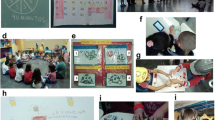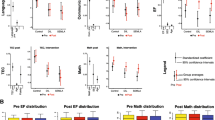Abstract
Executive functions (EFs) are foundational for the development of cognitive and social capacities critical for school readiness. The importance of promoting EF skills prior to school entry is increasing recognized but few preschool classroom-based interventions specifically target EF skills. The aim of this study was to evaluate the effectiveness of a classroom-based intervention, Red Light Purple Light (RLPL), to enhance 4-year-old children’s EF skills. Fifteen early childhood education (ECE) centers in Auckland, New Zealand participated. There was a total of 212 consented 4-year-old children across the 15 centers. Centers were randomized to either the RLPL intervention (twice weekly circle time games sessions over 8 weeks) or a waitlist control group (the usual curriculum). Children’s EF skills were measured at pre-, post-, and 4-month postintervention using the Head–Toes–Knees–Shoulder (HTKS) and Dimensional Change Card Sort (DCCS) tasks. Teacher ratings of behavioral self-regulation were collected with the Child Behavior Rating Scale (CBRS). Hierarchical linear mixed models were used to estimate the intervention effects, taking into account baseline scores, English vocabulary, age, and gender. Post-intervention interviews were conducted with 15 teachers. Significant short-term intervention effects were found for increases in EFs, based on DCCS scores. At 4-month follow-up, there were greater gains in CBRS scores for intervention group children. Teacher interviews indicated additional benefits of participation for children in self-control, language, and social skills. The study provides support for the effectiveness of the RLPL intervention, delivered by teachers in preschool classrooms, for improving children’s EF skills.

Similar content being viewed by others
References
Ackerman, D. J., & Friedman-Krauss, A. H. (2017). Preschoolers' executive function: Importance, contributors, research needs and assessment options. ETS Research Report Series, RR-17-22. https://doi.org/10.1002/ets2.12148.
Bates, D., Mächler, M., Bolker, B., & Walker, S. (2015). Fitting linear mixed-effects models using lme4. Journal of Statistical Software,67(1), 1–48. https://doi.org/10.18637/jss.v067.i01.
Bierman, K. L., & Torres, M. (2016). Promoting the development of executive functions through early education and prevention programs. In J. A. Griffin, L. S. Freund, & P. McCardle (Eds.), Executive function in preschool age children: Integrating measurement, neurodevelopment and translational research (pp. 299–326). Washington, DC: American Psychological Association.
Bierman, K. L., Nix, R. L., Greenberg, M. T., Blair, C., & Domitrovich, C. E. (2008). Executive functions and school readiness intervention: Impact, moderation, and mediation in the Head Start REDI program. Development and Psychopathology,20(03), 821–843. https://doi.org/10.1017/S0954579408000394.
Bronson, M., Goodson, B., Layzer, J., & Love, J. (1990). Child Behavior Rating Scale. Cambridge, MA: Abt Associates.
Cameron Ponitz, C., McClelland, M. M., Matthews, J., & Morrison, F. J. (2009). A structured observation of behavioral self-regulation and its contribution to kindergarten outcomes. Developmental Psychology,45(3), 605–619. https://doi.org/10.1037/a0015365.
Center on the Developing Child at Harvard University. (2011). Building the brain’s “air traffic control” system: How early experiences shape the development of executive function: Working Paper No. 11. Retrieved May 5, 2017, from https://www.developingchild.harvard.edu.
Denham, S. A., Bassett, H. H., Sirotkin, Y. S., Brown, C., & Morris, C. S. (2015). “No-ooo peeking”: Preschoolers’ executive control, social competence, and classroom adjustment. Journal of Research in Childhood Education,29(2), 212–225. https://doi.org/10.1080/02568543.2015.1008659.
Diamond, A. (2016). Why improving and assessing executive functions early in life is critical. In J. A. Griffin, P. McCardle, & L. S. Freund (Eds.), Executive function in preschool age children: Integrating measurement, neurodevelopment and translational research. Washington, DC: American Psychological Association.
Diamond, A., & Lee, K. (2011). Interventions shown to aid executive function development in children 4 to 12 years old. Science,333(6045), 959–964. https://doi.org/10.1126/science.1204529.
Duncan, R. J., Schmitt, S. A., Burke, M., & McClelland, M. M. (2018). Combining a kindergarten readiness summer program with a self-regulation intervention improves school readiness. Early Childhood Research Quarterly,42, 291–300. https://doi.org/10.1016/j.ecresq.2017.10.012.
Dunn, L. M., & Dunn, D. M. (2009). The British Picture Vocabulary Scale. London, England: GL Assessment Limited.
Frye, D., Zelazo, P. D., & Palfai, T. (1995). Theory of mind and rule-based reasoning. Cognitive Development,10(4), 483–527. https://doi.org/10.1016/0885-2014(95)90024-1.
Fuhs, M. W., & Day, J. D. (2011). Verbal ability and executive functioning development in preschoolers at head start. Developmental Psychology,47(2), 404–416. https://doi.org/10.1037/a0021065.
Gagne, J. R., & Nwadinobi, O. K. (2018). Self-control interventions that benefit executive functioning and academic outcomes in early and middle childhood. Early Education and Development,29(7), 971–987. https://doi.org/10.1080/10409289.2018.1496721.
Groothuis-Oudshoorn, K., & van Buuren, S. (2011). Mice: Multivariate imputation by chained equations in R. Journal of Statistical Software,45(3), 1–67. https://doi.org/10.18637/jss.v045.i03.
Hessling, R. M., Schmidt, T. J., & Traxel, N. M. (2004). Floor effects. In M. S. Lewis-Beck, A. Bryman, & T. Futing Liao (Eds.), The Sage encyclopedia of social science research methods (p. 391). Thousand Oaks, CA: Sage.
Hughes, C., Cutting, A. L., & Dunn, J. (2001). Acting nasty in the face of failure? Longitudinal observations of “hard-to-manage” children playing a rigged competitive game with a friend. Journal of Abnormal Child Psychology,29, 403–416. https://doi.org/10.1023/A:1010495319182.
Kendall, P. C., Comer, J. S., & Chow, C. (2013). The randomized controlled trial: Basics and beyond. In J. S. Comer & P. C. Kendall (Eds.), The Oxford handbook of research strategies for clinical psychology (pp. 40–61). Oxford: Oxford University Press.
McClelland, M. M., & Cameron, C. E. (2012). Self-Regulation in early childhood: Improving conceptual clarity and developing ecologically valid measures. Child Development Perspectives,6(2), 136–142. https://doi.org/10.1111/j.1750-8606.2011.00191.x.
McClelland, M. M., Acock, A. C., Piccinin, A., Rhea, S. A., & Stallings, M. C. (2013). Relations between preschool attention span-persistence and age 25 educational outcomes. Early Childhood Research Quarterly,28(2), 314–324. https://doi.org/10.1016/j.ecresq.2012.07.008.
McClelland, M. M., Cameron, C. E., Duncan, R., Bowles, R. P., Acock, A. C., Miao, A., et al. (2014). Predictors of early growth in academic achievement: The head-toes-knees-shoulders task. Frontiers in Psychology. https://doi.org/10.3389/fpsyg.2014.00599.
Ministry of Education. (2017). Te Whāriki: He whāriki mātauranga mō ngā mokopuna Aotearoa. Early childhood curriculum. Wellington, New Zealand: Ministry of Education. Retrieved May 2, 2017, from http://www.education.govt.nz/early-childhood/teaching-and-learning/te-whariki/.
Moffitt, T. E., Arseneault, L., Belsky, D., Dickson, N., Hancox, R. J., Harrington, H., et al. (2011). A gradient of childhood self-control predicts health, wealth, and public safety. Proceedings of the National Academy of Sciences of the United States of America,108(7), 2693–2698. https://doi.org/10.1073/pnas.1010076108.
Morgan, P. L., Farkas, G., Wang, Y., Hillemeier, M. M., Oh, Y., & Maczuga, S. (2019). Executive function deficits in kindergarten predict repeated academic difficulties across elementary school. Early Childhood Research Quarterly,46, 20–32. https://doi.org/10.1016/j.ecresq.2018.06.009.
R Core Team. (2018). R: A language and environment for statistical computing. Vienna: The R Project for Statistical Computing.
Raudenbush, S. W., & Bryk, A. S. (2002). Hierarchical linear models (2nd ed.). Thousand Oaks, CA: Sage.
Raver, C. C., Jones, S. M., Li-Grining, C., Zhai, F., Bub, K., & Pressler, E. (2011). CSRP’s impact on low-income preschoolers’ preacademic skills: Self-regulation as a mediating mechanism. Child Development,82(1), 362–378. https://doi.org/10.1111/j.1467-8624.2010.01561.x.
Riggs, N. R., Jahromi, L. B., Razza, R. P., Dillworth-Bart, J. E., & Mueller, U. (2006). Executive function and the promotion of social–emotional competence. Journal of Applied Developmental Psychology,27, 300–309. https://doi.org/10.1016/j.appdev.2006.04.002.
Schmitt, S. A., McClelland, M. M., Tominey, S. L., & Acock, A. C. (2015). Strengthening school readiness for Head Start children: Evaluation of a self-regulation intervention. Early Childhood Research Quarterly,30, 20–31. https://doi.org/10.1016/j.ecresq.2014.08.001.
Tamm, L., & Peugh, J. (2019). Concordance of teacher-rated and performance-based measures of executive functioning in preschoolers. Child Neuropsychology,25(3), 410–424.
Tominey, S. L., & McClelland, M. M. (2011). Red light, purple light: Findings from a randomized trial using circle time games to improve behavioral self-regulation in preschool. Early Education & Development,22(3), 489–519. https://doi.org/10.1080/10409289.2011.574258.
Torgerson, D. J., & Torgerson, C. J. (2008). Designing randomised trials in health, education and the social sciences: An introduction. Basingstoke: Palgrave MacMillan.
Valcan, D., Davis, H., & Pino-Pasternak, D. (2018). Parental behaviours predicting early childhood executive functions: A meta-analysis. Educational Psychology Review,30(3), 607–649. https://doi.org/10.1007/s10648-017-9411-9.
Zelazo, P. D., Anderson, J. E., Richler, J., Wallner-Allen, K., Beaumont, J. L., & Weintraub, S. (2013). II. NIH Toolbox Cognition Battery (CB): Measuring executive function and attention. Monographs of the Society for Research in Child Development,78, 16–33. https://doi.org/10.1111/mono.12032.
Zhao, J., & Schafer, J. (2018). Pan: Multiple imputation for multivariate panel or clustered data [R package version 1.6].
Acknowledgements
We would like to thank the participating centres, teachers, and children. We gratefully acknowledge the contribution of Professor Megan McClelland, Dr Shauna Tominey, and Alexis Tracy of Oregon State University, USA, for providing RLPL training to teachers. Thanks also to Professor Megan McClelland for providing access to the Head-Toes-Knees-Shoulders measure materials. The study was funded by the Wright Family Foundation, New Zealand.
Author information
Authors and Affiliations
Corresponding author
Ethics declarations
Conflict of interest
The authors declare that they have no conflict of interest.
Ethical Approval
All procedures performed were in accordance with the ethical standards of The University of Auckland Human Participants Ethics Committee, Reference Number: 020531, and with the 1964 Helsinki declaration and its later amendments.
Additional information
Publisher's Note
Springer Nature remains neutral with regard to jurisdictional claims in published maps and institutional affiliations.
Electronic supplementary material
Below is the link to the electronic supplementary material.
Rights and permissions
About this article
Cite this article
Keown, L.J., Franke, N. & Triggs, C.M. An Evaluation of a Classroom-Based Intervention to Improve Executive Functions in 4-Year Old Children in New Zealand. Early Childhood Educ J 48, 621–631 (2020). https://doi.org/10.1007/s10643-020-01023-x
Published:
Issue Date:
DOI: https://doi.org/10.1007/s10643-020-01023-x




